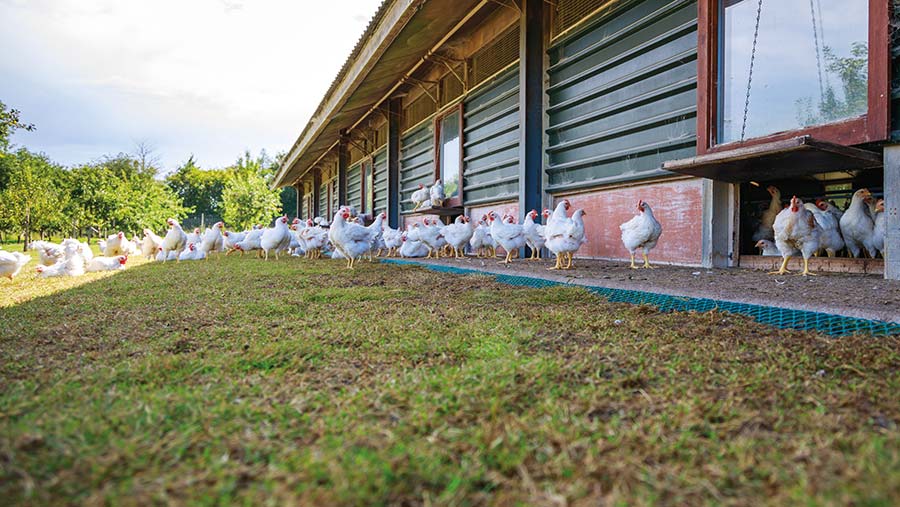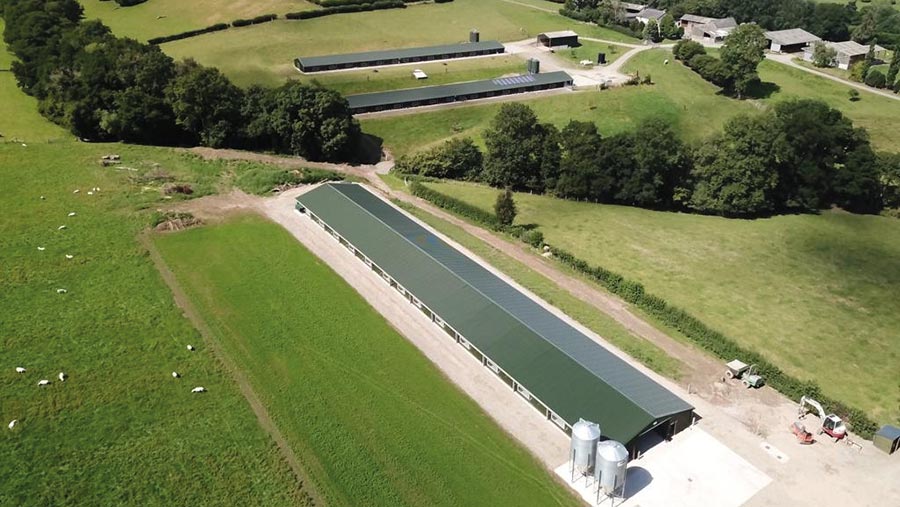Contract-rearing broilers creates reliable cashflow for mixed farm
 © Billy Davies
© Billy Davies Diversifying into contract poultry production meant a significant outlay in sheds and equipment for Powys beef and sheep farmers Billy and Rachel Davies. But the enterprise is profitable and generates a consistent cashflow.
The family built two sheds at Gumma Farm, a hill farm at Discoed, Presteigne, in 2010, each with capacity for 10,000 birds.
They initially supplied Cargills, and when that contract ended in 2019 they switched to Pembrokeshire-based Capestone Organic Poultry and now grow for its contract with Marks & Spencer.
See also: On-farm poultry manure pelletisers – the options and costs
Regular income
That partnership has been so successful that they had the confidence to build a third shed in 2021.
The agreement sees the Davies supplying the shed, electricity, gas and management, and Capestone providing the birds and feed.
The Davies, who produce 5.5 crops a year in each shed, are paid a price per kilo of chicken produced as a lump sum after every crop, with the cost of the birds and feed deducted from that total.
“It gives us a regular income every two months,” says Mr Davies.
In contrast, the returns from beef and sheep production can be unpredictable. “It can be a slow process getting a return on what can be a significant outlay, but with chickens the payback is quicker.
Fertiliser
He still produces lamb from 1,100 breeding ewes and beef from 50 suckler cows, and also grows 12ha of barley and 8ha of fodder beet.
He uses the chicken manure – 250t/year – on his arable crops and grassland and this has helped to significantly reduce his synthetic fertiliser costs.
“It has been absolutely revolutionary in terms of phosphorus and potassium – it has made our business far more sustainable, says Mr Davies.
Another bonus is that it is not an operation dictated by the weather. “When it is wet and windy outside the chicks are happily growing inside. When so much in farming is weather dependent I like that side of it, Mr Davies admits.
Diversification in poultry rearing was also part of a succession plan. “We have two daughters and it was one of the reasons why we went into chickens, with one eye on the future, says Mr Davies.
How the Capestone contract works
Investing £250,000 in a new rearing shed is a significant outlay for any farm business.
But Capestone’s managing director, Rob Cumine, says growers get an initial five-year contract and a payment of £1.15/sq m a week, based on a 10-week crop cycle – a guaranteed 15% return on investment.
Since its acquisition by the French poultry supply company LDC Group in October 2021, Capestone has been scaling up production.
It is now processing 60,000 free-range organic and corn-fed poultry a week and has a target of 120,000, which it hopes to achieve by 2024.
It uses a mobile system to rear organic poultry at its site at Walwyn’s Castle, near Milford Haven, but outsources a big proportion of its free-range operations.
Contract growers have played a major role in its expansion plans since 2019, when it established its first agreement. It now works with 16.
Business growth
Capestone says this approach allows it to grow its business without acquiring land, while providing a new source of income for farm businesses that can commit 1ha of land per 10,000 birds to allow them to range.
“On a relatively small acreage, farmers can create a diverse, profitable enterprise that adds a significant amount to their bottom line in a sector of the market that is growing,” says Mr Cumine.
“We see this as an ideal opportunity for a farm that wants to diversify as it requires minimal labour and provides good returns.”
The economics of poultry growing looks good in the long term, he adds, with contract growing offering a secure and steady income flow and return on capital.
To meet welfare regulations on transport, partner farms are within a three-hour journey from Capestone’s processing facility at Walwyn’s Castle.
There is also a requirement for a farm to have suitable access for articulated lorries.
Seventy per cent of the farms the company currently works with are beef and sheep producers.
Joe Rimmer, a member of Capestone’s agricultural team, says the opportunity is a good match for those businesses.
“Our growers tell us that the 1ha where they have developed the poultry enterprise is the most profitable hectare on the farm.

© Stephen Jaques
Capestone’s contract growers benefit from weekly visits during their first two crops and after that there is at least one visit a crop.
“We can offer as much or as little assistance in all areas, as required by the grower,” says Mr Rimmer.
The business model has worked so well that some of the growers are applying for planning permission for their third shed.
“The more sheds they have, the lower their fixed costs, Mr Rimmer points out.
To get more farmers on board, Capestone has adapted the business model to offer a less capital intensive supply route for new growers who don’t want to invest in new build, by converting existing sheds.
Mr Cumine says this has been a good fit for free-range egg producers who want a lower labour input. “Our programme is less labour-intensive than egg production, with a rest period every eight weeks.
The level of investment required for this approach varies according to the existing facilities, but growers are offered a “new unit premium” of £0.10/sq m a week on conversions, taking the price paid to £1.25/sq m a week.
“We have to make individual assessments on each applicant’s farm as to whether a shed or unit is suitable for conversion,” says Mr Cumine.
“If it is, we introduce farmers to the various suppliers they need to use to get converted and provide the necessary expertise in what they will require.
The UK free-range market has a weekly demand for 500,000 chickens, and Capestone currently produces a small percentage of those.
“The potential for growth is huge, says Mr Cumine. “A combination of Brexit, the pandemic and an increasing concern about how food is produced means there is a big demand for free-range.”
Richard Thomas of Tan House Farm, Radnorshire, started growing chickens for Capestone three years ago.
He describes it as a “fantastic opportunity” and a natural progression from his core beef and sheep business. “It is really working well,” he says.
So much so that he had the confidence to invest in a second rearing shed and now has 20,000 chickens at any one time. “Yes, it is twice as much work, but twice the rewards too,” he says.
One of the unexpected benefits has been a 70% reduction in his fertiliser bill because he has a source of chicken muck to apply to the land.
